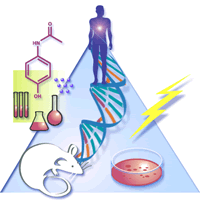Environmental Stress & Cancer Group
Regulatory Networks Involved in Responses to Environmental Stresses
-

-
Richard S. (Rick) Paules, Ph.D.
Principal Investigator and Director, Molecular Genomics Core -
Tel (919) 541-3710
Fax (919) 316-4771
paules@niehs.nih.gov -
P.O. Box 12233
Mail Drop D2-03
Research Triangle Park, North Carolina 27709
Delivery Instructions

Research Summary
The Environmental Stress and Cancer Group investigates the molecular mechanisms of responses to environmental stresses involved in the etiology and progression of injury and disease processes.
All living organisms are constantly faced with challenges to the integrity of their genomes from both endogenous processes and exogenous sources. To guard genomic integrity and to protect against cancer and other diseases associated with genomic instability, cells with DNA lesions activate a complex network of intersecting pathways referred to as the DNA damage response (DDR) that leads to either cell cycle arrest and repair of damage allowing for resumption of normal cellular processes or cell death if the damage is too severe. Central to the DDR are several key protein kinases including the ATM protein kinase that is activated in response to the highly toxic DNA double stand break (DSB) and chromatin alterations, the ATR protein kinase that is activated by lesions that generate single strand DNA (ssDNA), and the DNA-dependent protein kinase catalytic subunit (DNA-PKcs) that is activated by DSBs and is required for non-homologous end-joining repair. Group members are investigating cross-talk between these key DDR protein kinases and their downstream signaling pathways. We are testing the hypothesis that disruption of the function of key members of the DDR, in particular ATM, ATR and DNA-PK, will reveal cross-talk and network redundancies that are important in protecting genome integrity from adverse environmental exposures. The impact of these studies will be to identify 1) protective compensatory signaling pathways that might be enhanced in individuals with genetic or epigenetic deficiencies in DDR function and exposed to environmental genotoxic agents, and 2) compensatory signaling pathways that could be targeted for disruption pharmacologically or epigenetically to improve therapeutic efficiencies for treatment regimens through synthetic lethality approaches when DDR signaling is found to be defective in tumors or other diseases arising from adverse environmental exposures.
In addition, the group is integrating conventional studies of environmental stress and toxicity with global "omics" approaches, or toxicogenomics, in studies designed to relate alterations in global gene expression to adverse effects defined by conventional parameters of toxicity and pathology. Studies are designed to provide insight into mechanisms of injury and disease as well as to establish signatures of adverse effects to develop putative biomarkers. We have utilized microarray and NextGen sequence analyses for global gene expression and global microRNA expression profiling to examine genomic responses to environmental stresses. Analyses that implicate a critical role of a particular biological process or of a particular gene in an adverse response are followed up with additional experiments designed to test hypotheses concerning these roles.
Major areas of research:
- Molecular mechanisms of response to environmental stresses
- Molecular events that regulate DNA damage responses and cell cycle checkpoint signaling
- Phenotypic anchoring via toxicogenomics
Current projects:
- Determining molecular components of cross-talk in the DDR kinase signaling network initiated in response to DSBs in the presence and absence of ATM function
- Determining cross-talk and redundancy in the network of ATM-dependent and ATM–independent DDR global transcriptional responses to DSBs
- Understanding mechanisms of disease and injury
- Developing putative biomarkers
Richard S. Paules, Ph.D., heads the Environmental Stress and Cancer Group and directs the NIEHS Molecular Genomics Core within the Laboratory of Toxicology and Pharmacology. He received his Ph.D. from the Department of Pathology at the University of North Carolina at Chapel Hill in 1984. He has authored over 90 peer-reviewed articles in leading biomedical journals, as well as 17 book chapters and invited publications. He holds adjunct appointments in the Department of Pathology and Laboratory Medicine and the Lineberger Comprehensive Cancer Center at UNC-CH. He also serves as Associate Editor of Physiological Genomics and BMC Genomics and serves on the editorial review board of Environmental Heath Perspectives. Since joining the NIEHS, Paules has been recognized with four NIH Merit Awards, the NIH Director's Award and the Society of Toxicology’s 2010 Leading Edge in Basic Science Award.
Software
- Systematic Variation Normalization (SVN)
("/Rhythmyx/assembler/render?sys_contentid=35622&sys_revision=3&sys_variantid=639&sys_context=0&sys_authtype=0&sys_siteid=&sys_folderid=" sys_dependentvariantid="639" sys_dependentid="35622" inlinetype="rxhyperlink" rxinlineslot="103" sys_dependentid="35622" sys_siteid="" sys_folderid="")A procedure for removing systematic variation in microarray gene expression data.

